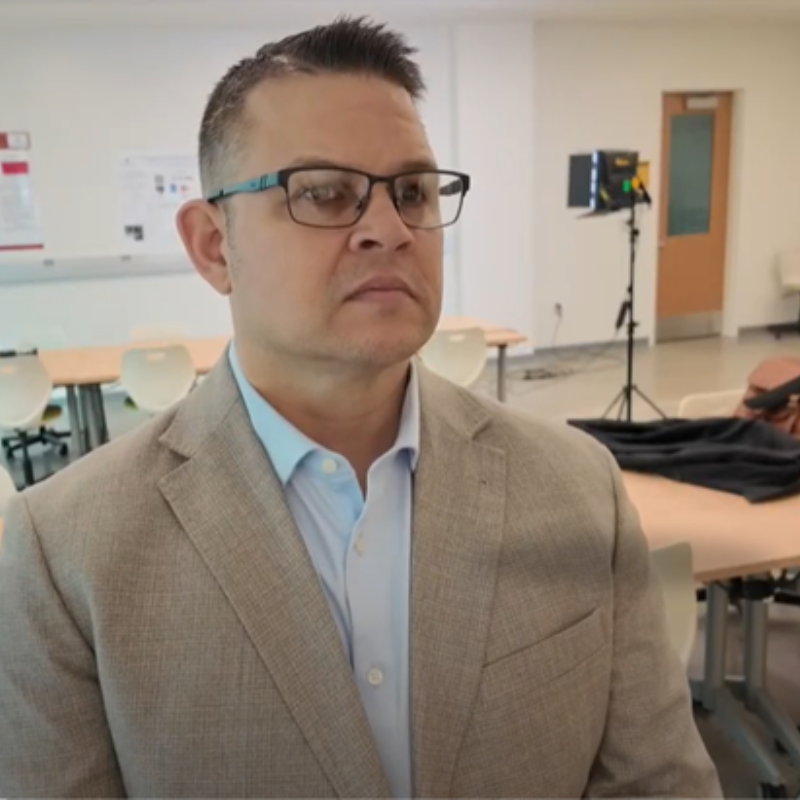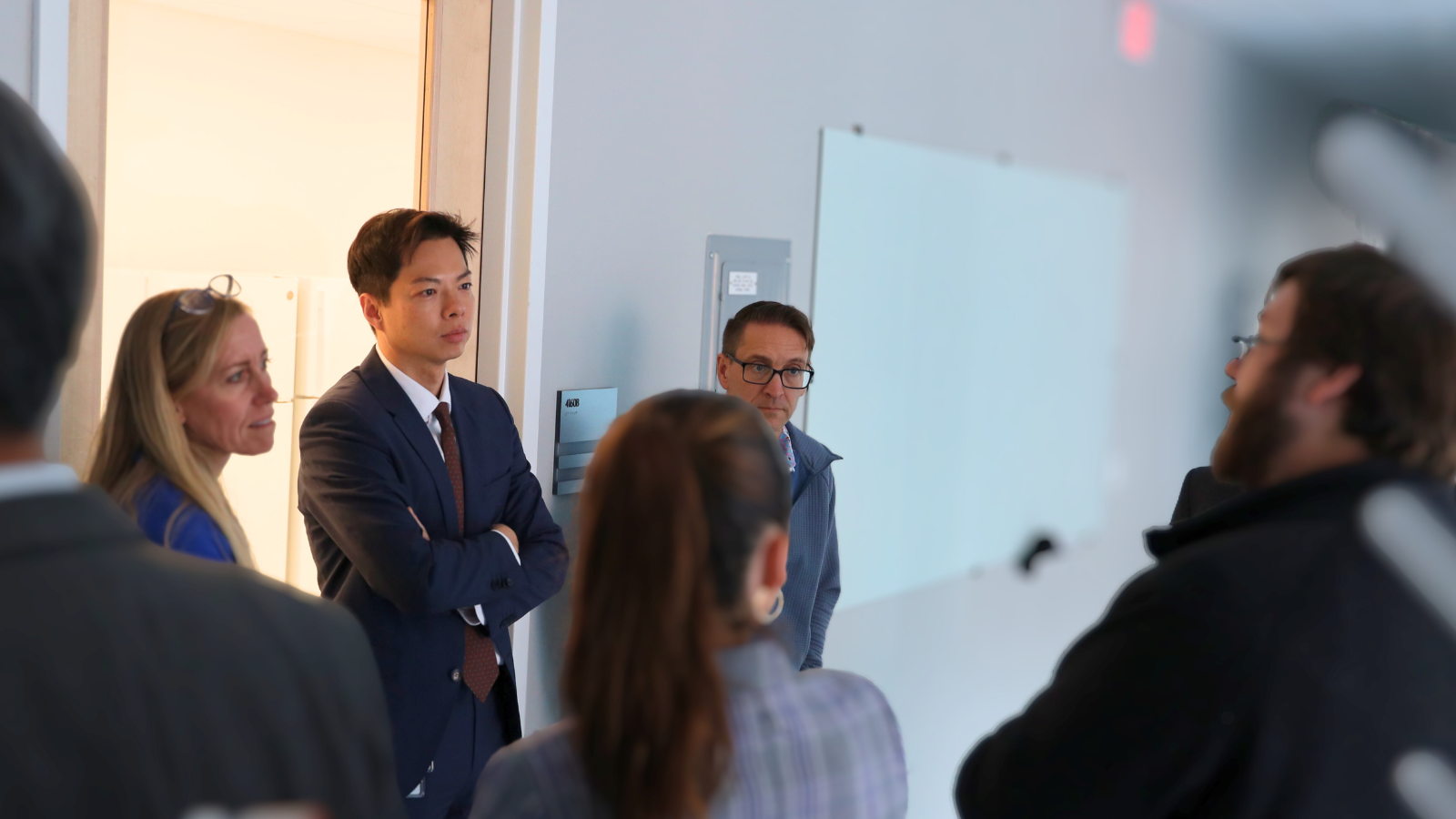News Story
Student Spotlight: Miguel Martinez

Miguel Martinez is a current student at the Fischell Department of Bioengineering's Biocomputational Engineering undergraduate degree program (BCE) based at the Universities at Shady Grove. The program is intended to meet the growing demand for engineers with an expertise in both the biological sciences and computational methods.
In this Q-and-A-style Spotlight, Miguel—a US Air Force Veteran, first-generation college student, and loving father—speaks about some of his experiences in and thoughts about the program as he approaches graduation this spring. Read on to learn more about Miguel and the BCE program, or watch Miguel's Student Profile on YouTube or below.
How did you decide to pursue biocomputational engineering?
During my initial semester at Montgomery College, I began with a focus on computer science, recognizing its perceived stability in terms of employability. I stumbled upon an email discussing biocomputational engineering, a program that immediately piqued my interest due to its integration of three key areas: biology, computer programming, and engineering. I attended an open house event and from that point forward, I made it a priority to attend every open house.
Did you have interest in the University of Maryland before you decided on biocomputational engineering?
Yes, I had planned to complete my first two years at Montgomery College and then transfer in at the University of Maryland. I wasn’t focused on the name brand of the degree, my main focus was receiving a Bachelor's degree, especially being one of the firsts in my family to acquire one.
How would you describe your learning experience in the Biocomputational Engineering degree program?
When I applied to the program, I had already attended so many open houses and met some faculty. In my first semester in the program, I still couldn’t quite articulate what the program was about versus now. Now, I have a solid foundation and can explain it. Being exposed to the material, taking all the classes, and actually employing the material we’re learning, I understand it now. Each semester builds off the previous semester. The lecture part is tedious but applying the theory and seeing it in action is definitely helpful in understanding what biocomputational engineering is.
What aspects of the program have been the most rewarding and most challenging for you?
I really enjoy the machine learning aspect of the program. Machine learning in the program is very versatile. It can be applied to anything. Applying the machine learning aspect to biological problems was intriguing. Applying our knowledge to various medical issues such as viral loads and cancer has been rewarding and motivational. The most challenging aspect for me was mathematics. I made it a habit to learn on my own time and become self-motivated. I like that we have smaller class sizes, we have more one-on-one time with the professors. We also all help each other, there are things that I’m strong at that my other classmates aren’t, and vice versa. We all help each other stay at the same pace. The teachers are always readily available to answer any questions we may have.
How has the program prepared you for graduate school, a Ph.D. program, or industry experience?
All the professors I’ve talked to from graduate schools are really intrigued that I’m coming in with a skillset that’s unique and generally not found at an undergraduate level. It opens up more doors for them because I’m a more versatile candidate. AI is growing at an exponential rate, especially in healthcare. The fact that BCE is producing graduates that are already capable, after a bachelor’s, to start making a significant impact is extremely beneficial.
How have the projects and courses had an impact on your understanding of biocomputational engineering?
Biocomputational engineering is so versatile. For example, we’re taking machine learning classes and doing machine learning projects, taking biology classes and doing biological related projects. You get to the point where you can start doing a blend of the two. I can take what I learned a year ago and start employing it now, I’m now putting an aspect to something that originally didn’t have it before. It’s very rewarding to start doing something in the program, unguided, because I already had the tools to know how to do it.
As you approach graduation, how do you envision applying your biocomputational skills to a future career?
I’m pursuing a graduate degree in biomedical engineering. I am honored to have been selected for the HW College of Engineering Dean's Research Award, a truly prestigious recognition. As a result, I am thrilled to announce that I will be attending the University of Florida for my Ph.D. in Biomedical Engineering. I’m excited to keep employing the computational aspects of everything I’ve done at a higher level. My area of interest is cancer, and I would like to apply machine learning techniques and AI methodology towards cancer research in some way.
What advice would you give to fellow students and prospective students?
I would tell them to ask questions now. If you want to set yourself up for next Fall, start talking to people now, in the Spring. Make it known that the University of Maryland has these students with a particular skill set. It would be supremely helpful to already have knowledge about a school you’re interested in. A lot of STEM programs are highly funded from outside institutions. The possibility of graduating from a graduate degree, debt-free, is very attainable.
Outside the classroom, what do you like to do in your spare time?
I’m a family man; I have four children. If I’m not helping my kids with homework or helping with parent volunteer work, I like to play video games or work on my car in my downtime. I like doing something that will have an end product. This gives me a break from reality and something productive to do.
What accomplishment are you most proud of?
Going to school has been my proudest accomplishment. I took a non-traditional pathway to school. I went to culinary school after I retired from the military seven years ago. When I got exposed to the baking side of things, I found it to be challenging but very interesting. Every little thing matters in a recipe, there’s a lot of chemistry involved. However, after culinary school—as much as I enjoyed doing it—I realized I need to do something else with my life. That’s what led me to computer science, which eventually led me to biocomputational engineering.
Published March 29, 2024









